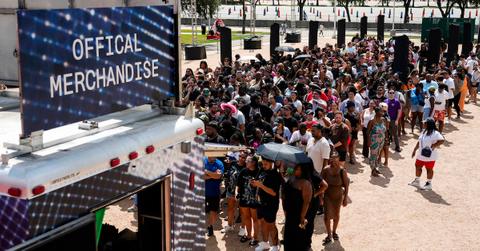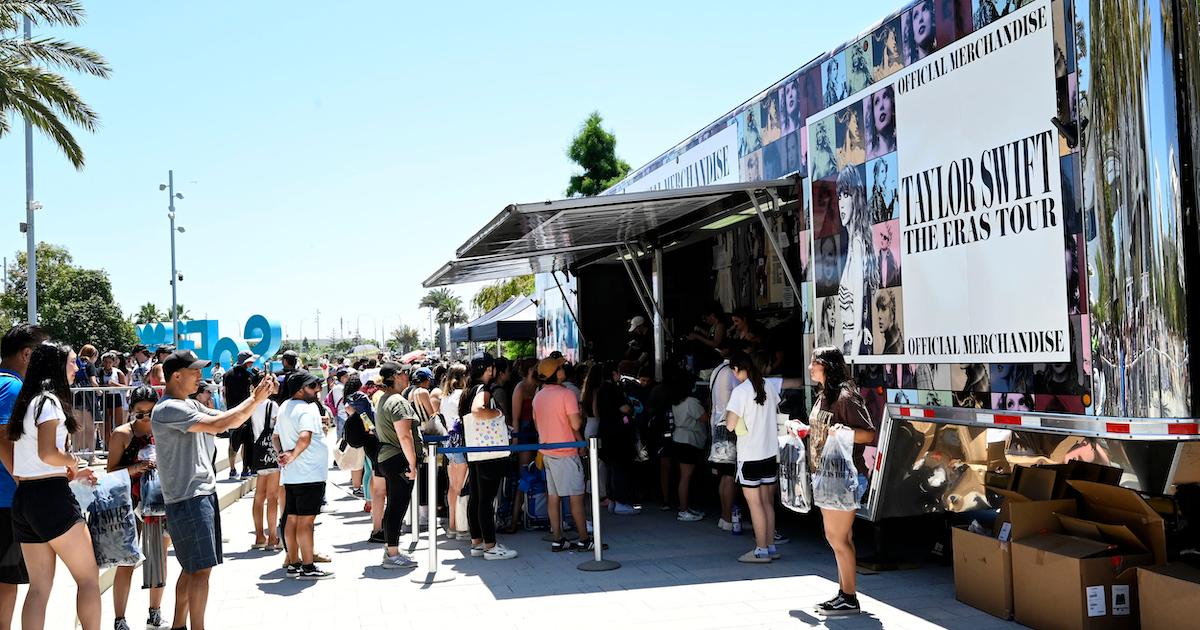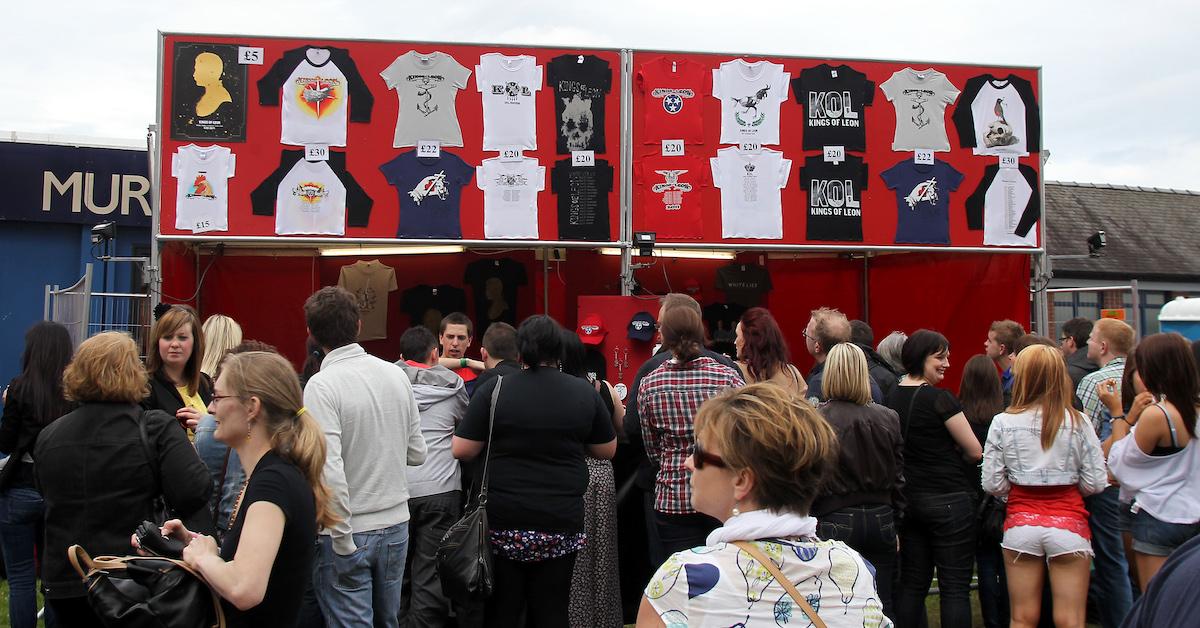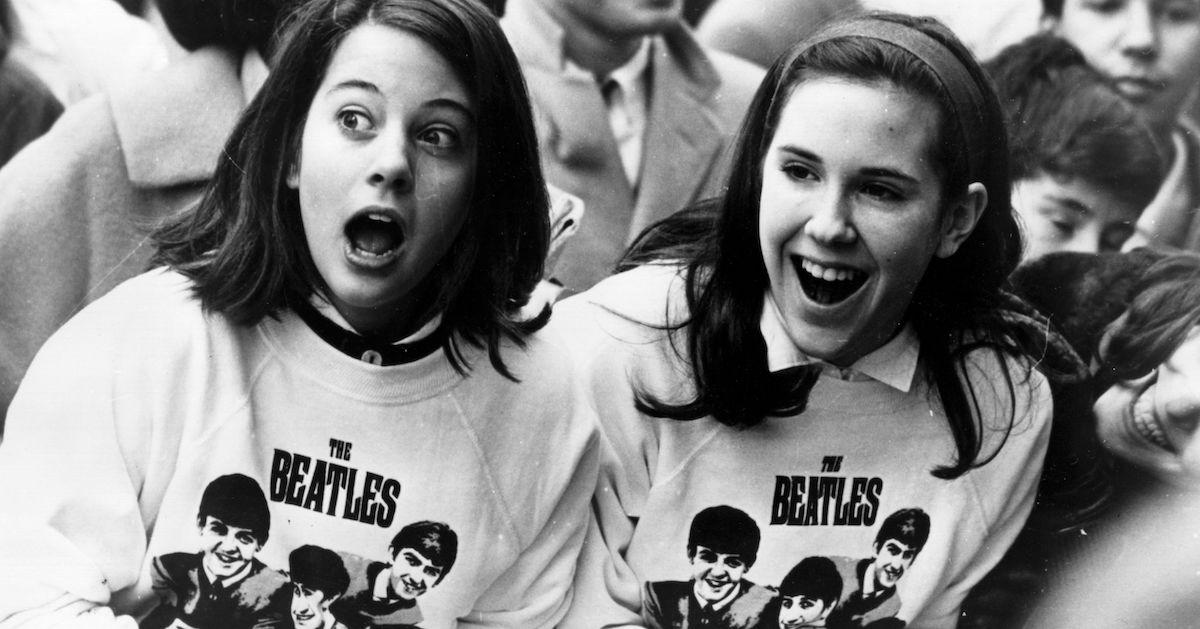Opinion: The Dark Side of Music Merchandise
Published Feb. 7 2024, 10:04 a.m. ET

Beyoncé fans line up at NRG Park to purchase merchandise before the artist's two concerts at NRG Stadium, Saturday, Sept. 23, 2023, in Houston.
People often equate visibility with importance. The truth is, famous peoples’ lives aren’t worth more than the lives of everyone else. We’re all deserving of dignity, kindness, compassion, care and protection. The complexities of pop culture and its sway over the public can sometimes hide this truth.
Whether they’re selling out stadiums or performing for friends at a local venue, musicians often sell merchandise. This offers artists an additional revenue stream, and gives fans a way to show and represent their support. From band T-shirts to limited edition vinyl records, these items have become a staple in the music industry. However, beneath the surface, there lies a concerning trend within this merchandise culture that often goes unnoticed: the fast fashion epidemic and its inherent racism.
More specifically, there are consequences to purchasing and producing cheaply made merchandise and these consequences disproportionately affect marginalized communities, particularly low-income Black and brown people around the world. Despite praises from businesses of economic development in these communities, the reality is more complex. For example, cotton T-shirts are often praised for not being made of polyester, but reports have shown that 1 in 5 cotton garments come from supply chains tainted by slave labor.
Musicians have the potential to engage and influence culture in ways that scientists and politicians cannot. This presents a unique opportunity for the modern artist to explore how they may use their influence for good and help facilitate a cultural shift away from our dangerous norms of exploitation.

A crew of hard working people were busy filling orders as fans lined up by the thousands to purchase Taylor Swift merchandise at SoFi Stadium in Inglewood on Wednesday, Aug. 2, 2023.
These are some of the things that must be changed and challenged:
1. Unethical labor practices:
Many clothing manufacturers still use unethical labor practices. This can look like unsafe working conditions, low wages, or the exploitation of vulnerable communities. The collapse of Rana Plaza in 2013 is an infamous example, claiming the lives of more than 1,000 workers in Bangladesh.
2. Environmental impact:
The production of cheap merchandise often involves harmful chemical treatments, runoff from dyes, and excessive water usage, contributing to pollution and environmental degradation. Cheap production costs are frequently found in countries with less environmental regulation, making them a popular choice for profit-focused corporations.
Poorly-made clothing also doesn’t last as long, and according to EPA estimates, in the year 2018, only about 13 percent of discarded clothing and shoes actually got recycled. The rest likely end up in a landfill, where they take hundreds of years to break down, among other issues.

Two fans show their Coldplay T-shirts on July 2, 2022 in Hessen, Frankfurt.
3. Limiting economic opportunities:
The fast fashion industry often relies on outsourcing production to low-wage countries, which can lead to the displacement of local industries. This threatens and disturbs local economies, sometimes forcing people to work for these companies after their local economies are disrupted. This economic imbalance disproportionately affects marginalized communities around the world.
4. Lack of transparency:
Many merchandising companies still fail to provide transparency about their manufacturing processes, making it difficult for consumers and artists to determine the true impact of their purchases. This lack of accountability enables the perpetuation of exploitative practices and prevents people from making informed decisions.

Fans queue to buy Kings of Leon merchandise before the concert at Murrayfield Stadium in Edinburgh.
What can be done differently?
1. Pursuing alternative suppliers:
As consumers become more aware of the consequences of fast fashion, there has been a rise in ethical merchandise alternatives. Artists can play a crucial role in promoting sustainable and fair-trade merchandise options, empowering fans to make conscious choices that align with their values.
For instance, Taylor Swift's Lover merch was designed by eco-conscious designer Stella McCartney. Other musicians have sold somewhat-sustainably produced clothing, including Olivia Rodrigo and Lorde, the latter of whom opted not to cell physical CDs for her album Solar Power. And The 1975 once printed new logos on the band's unsold T-shirts from a few years back.
2. The power of awareness:
By discussing and raising awareness about the fast fashion epidemic through musician communities, we can encourage artists, fans, and corporations to reconsider their choices. Together, we can demand transparency, fair labor practices, and a shift toward sustainable merchandise that respects both human rights and the environment.

Two excited girls in Beatles sweatshirts, amongst a crowd of fans in New York, welcoming the group as they arrive at the airport, on Feb. 10, 1964.
3. Engaging beyond consumerism
Harmful industries like fast fashion rely on us to look the other way and encourage people to constantly buy and discard items without considering their true value. Musicians can break this cycle by promoting more meaningful forms of engagement with their music, such as organizing events.
The fast fashion epidemic has far-reaching consequences, and as cultural stewards, musicians can play a valuable role in transforming the ways we interact with these systems. Everyone can be involved in our journey to create a better future. Being more mindful about what we create and what we purchase is a crucial step in the right direction. By demanding transparency from our favorite artists and brands, supporting ethical alternatives, and engaging in meaningful conversations, we can work towards a more sustainable and equitable future for all.
Isaias Hernandez, aka Queer Brown Vegan, is an educator and creative devoted to improving environmental literacy through content creation, storytelling, and public engagements. Stephanie Dillon is an artist who believes that old is still beautiful, what we have is enough, and art is everywhere.